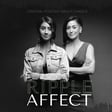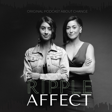Introduction to 'The Ripple Effect'
00:00:04
Speaker
You're listening to The Ripple Effect with your hosts Cheech and Nippy, a podcast that explores how individual change has the capacity to affect the whole. From neuroscience to donuts, we're two sisters with a deep curiosity for ancient wisdom and modern knowledge, and we're obsessed with learning alongside you because we don't know. Let's dive in.
Introducing 'Tactical Bite' Series
00:00:28
Speaker
Welcome, Cheech here. I'm really excited to bring you my first tactical bite. These are our shorter series that are meant to bring you tangible tools for your toolbox.
Exploring the Four Stages of Competence
00:00:38
Speaker
In this episode, I share the four stages of competence, a learning model that describes the psychological stages we go through when we are learning a new skill, and also how I found it helpful when I applied it to my personal growth development.
00:00:51
Speaker
Now, this particular episode is a little different than those you may hear in the future from this series of tactical bites because you'll hear both my sister and me having a conversation around this model of learning. Whereas more often than not, our tactical bites will be from either myself or my sister, Isa, who I lovingly call Nibi. If you listened to episode three and heard her talk about the psychological phases of change,
00:01:13
Speaker
then you'll recognize that this episode is from the same early-on convo, and my mic situation was not ideal. Basically, I forgot to plug it in. We've done our best to clean it up, but hey, you know, we're the almost clan for a reason, and we're about progress, not perfection. So, with no further ado, you're about to dive right into ESA asking me what I've learned that helped me with change. Enjoy, and you'll hear from me on the back end.
00:01:39
Speaker
Okay, so I know that you had kind of a different structure that was helpful for you when you started to look at the different stages of change. Do you mind sharing that? Yeah, when you said you had a framework that really gave you a lot of clarity, this was the framework that I found from psychology that gave me a lot of clarity.
Understanding Competence Stages: Awareness and Effort
00:01:58
Speaker
And it was the four stages of conscious competence. And it's a learning model that relates to the psychological states
00:02:07
Speaker
that are involved in the process of progressing from incompetence to competence as a skill set and or in a skill, I overlaid that on my own process of personal growth development. And I found that was really helpful because the four stages, the first stage is unconscious incompetence, where you don't know
00:02:30
Speaker
that you are incompetent about something. You're going along and you're like, yeah, I'm doing that, you know, whatever the pattern keeps happening and there's not a consciousness around it. And then you go from being unconsciously incompetent to being consciously incompetent. And this was the first one where I was like, oh, wait. So even if you, once you become aware, this is like the stage where you become aware that you have a lack of a skill or you, you are aware that there's an issue.
00:02:59
Speaker
or that there is something that you want to change and that you're incompetent around it, meaning like, I know that word can have like some charge to it, kind of can kind of sound demeaning, but I just took it for what it was and I was like, oh, right, okay, so now I'm consciously incompetent.
00:03:15
Speaker
And there's a gap in my understanding of how to do things. So the next state is conscious competence. And conscious competence is the stage where you've acquired the necessary knowledge and the skills in that area. And you still though must be conscious and deliberate about applying them.
00:03:32
Speaker
Driving is the best example. It's like, okay, now you've driven for a while and you have that skill set. You know how to drive. You're not completely freaked out by the blinker and the brake and the gas. And so that place of like, you still have to pay attention though when you're driving or when you're like, oh, I still gotta do this thing. I still gotta effort. I still have to make sure that I'm focused in a way where I don't just wreck this car.
Navigating Perfectionism and Self-Awareness
00:03:57
Speaker
Well, there's a cool thing about that too. Driving cars, the best example of the amygdala taking over.
00:04:02
Speaker
I think this is where I'm going with this. So go ahead. No, okay. The unconscious competence is the fourth and final stage, unconsciously competent. And what that does is that, you know, you've mastered this skill to the point where it becomes completely automatic and intuitive. You don't have to think about doing that. And I think that for me, when I started to explore change and personal growth development for myself, I was honestly in the stages of being consciously incompetent.
00:04:33
Speaker
And then moving into like, okay, now I can recognize naming. I'm a recovery perfectionist. I watched that behavior come up. You know, I'm aware it's happening. It's going to happen. You know, I get freaked out. I go into freeze, I procrastinate, and then I have shame. It's like, whoa, that's not going to change. It's just happening. And then moving into that conscious competence stage was like, oh, I can see that this overwhelming sense of
00:05:01
Speaker
not enoughness is coming through me, and I have to breathe and overcome that freeze to pick up a phone and call the person so that I can keep moving forward on the things. It's hard, it takes a lot of focus, but I can actually do it. I'm building that skill set to go beyond allowing perfectionist to just rule the roost and not calling the person until I'm absolutely ready.
Integrating Competence Stages in Growth
00:05:28
Speaker
When I heard that fourth stage of unconscious competence, when it was just all of a sudden you're a being who, not all of a sudden, but you get to the stage where you're a being who has mastered that piece in you, where you're now, you're being that thing. And honestly, I'm not there with perfectionism. It's a lot of, I sometimes catch myself. This is a perfect example. I was late to a meeting and I apologize for being late, realized I didn't have it in my schedule right.
00:05:57
Speaker
and then moved right on. We went into the meeting and I didn't track till after the fact where I was like, oh wow, that would have put me in such a shame spiral. I would have had to apologize many times. It would have frenzied me up. The shame that would have occurred because it wasn't perfect. I didn't get there. I should be ashamed, right? And I didn't. I was able to move through that and that was an example for me of that
00:06:26
Speaker
unconsciously competent in mastering, you know, the art of moving beyond and recovering from being a perfectionist. And so there was these little wins, but what strikes me as interesting about that fourth and final stage is you don't notice that you're doing it anymore. It just is a part of who you are. And to me, the integration of these four stages is what fascinated me was that you
00:06:53
Speaker
every stage and every stage and every stage you get to integrate and it allows you to you know step into that next being of what you're becoming and knowing that there's stages that you have to work through you know and it's all about it's all change it's all the process and the
00:07:22
Speaker
progressive steps it takes.
Community Support in Personal Growth
00:07:24
Speaker
I agree. Yeah, it's all process and the steps and celebrating those wins when you recognize, yeah, I did get through that meeting without shaming myself through the whole thing and making other people uncomfortable with the amount of shame I held for showing up four minutes late. You know, like that is progression and it deserves to be honored and celebrated and you pat yourself on the back. Like it's we're all going through different things. We all have iterations of that same example you gave.
00:07:52
Speaker
where you realize something about yourself and you want to change it, and then you either do it or you don't. But when you do do it, I think it is important to share it and celebrate it in whatever capacity you can. And I think we don't all have friendships, like healthy enough friendships to be able to share those things in
Balancing Being and Doing with Ancient Wisdom
00:08:10
Speaker
it. And I think that
00:08:12
Speaker
you know, the community you and I are trying to build, Quiata is is is celebratory, is supportive and is a place where people can say, hey, I am a recovering perfectionist, too. And I actually thought of you when I went into a meeting late and I was able to like stop that, you know, critical parent process thing in my mind and be like, it's OK and move on. You know, so I just think it's important to let everybody know what, you know, what we're trying to
00:08:43
Speaker
build and the community we want to show up in and as. You mentioned something, Kyara, about being that next iteration of yourself and being in that unconscious competence phase. And we've talked about being, like that you're a human being, not a human doing. And I expressed how kind of turned off I get with the woo-woo
00:09:11
Speaker
the vernacular around it. And Kyara, you talked to me about how much ancient wisdom there is around these things. And your quote that was so on point is, if you don't know how to be, the doing is way fucking harder. It's really true. It starts with like, how are you being? Every day you show up and you're being a certain way.
00:09:37
Speaker
you know, like however you're doing your life, you are being, you know, throughout your day, you show up and you be all day and you're doing on top of it. But I think like, I just don't like the whole like, you know, be first and like learn to be like don't do be it just feels a little like fluffy for me. So I really wanted to pull that down. And, and I know we've talked about exploring, you know, what does it mean to be and I think, I think there's some intersections of this.
00:10:06
Speaker
We're all human. We're the species on this planet. We're at a point in time in our evolution that is critical.
00:10:12
Speaker
in a lot of ways and how do we go back to basics of, okay, first of all, let's start with the
Honest Self-Assessment and Societal Pressure
00:10:20
Speaker
individual. You know, I love the, I use it all the time, my hula hoop. Like I learned that a long time ago in Al-Anon of like, if it's in my hula hoop, I can, I'm responsible for it. I can control it. If it's outside of my hula hoop, it's not my monkeys, not my circus. So like we go back to basics, like what's in our hula hoop? Like how are we being?
00:10:42
Speaker
with ourselves? How are we treating ourselves? What are we putting in our bodies? What are we consuming? What are we choosing to think? Are we taking actions towards our health or not? And where are we at? You can't change something if you don't measure it. You have to measure. You have to know where you are to see if you've changed. There is a linear nature to change.
00:11:09
Speaker
I think being is a good place to start. Like, where are you at? I wanted to say, like, I think that it's such an important part, this idea of self-assessment. And part of when I started to do this work, I realized being honest with where you're at. Because, you know, I guess to put it in more of like a bleak way, but it's like to lie to yourself,
00:11:36
Speaker
Even if it's not on purpose, it doesn't help you measure accurately, you know? And I think because of shame and societal pressures, a lot of times I can speak for myself, I wanted to be further along. I wanted, I wanted, or pain, just the pain I was in. I don't want to be where I'm at. I want to be over there and to have like enough
00:12:04
Speaker
It goes to like a really core thing to have enough self worth to build up even a little bit to be okay with your own honest truth of this is where I'm at. And I think what's beautiful about life is that you have a metric for where you're at all the time. It's how are you being?
00:12:23
Speaker
Like, what are the behaviors? What are the current patterns and habits you have?
The Ripple Effect of Personal Change
00:12:27
Speaker
Those tangible exports from your insides of what you think, believe, feel exported out into what you do. And then it's like, and those reverberate back to you in the form of your life. But this podcast isn't about changing your life. This podcast, in my opinion, is about changing your self inside so that you can
00:12:53
Speaker
potentially even just have enough momentum to have an affect on your life. And then hopefully beyond that, if you want, if you want to impact your family, your community, the bigger hole. It's not even a want. It's not even a want. It will just happen. It literally is a ripple. Like you see it with recovery. It's like you change yourself. You change your attitudes. You change your outlooks. You change your reactions to things and things start to change around you.
00:13:22
Speaker
It just happens, you know? And it's one way if you really, really, really do want to change things, it works. Like if you want to change things outside of yourself, take that thing that you want to change about somebody, about your husband, about your boyfriend, about the world and fucking bring it into your backyard, bring it into your home, bring it into your own mouth and eat it and figure out how to do it within yourself.
00:13:47
Speaker
I should say, let's figure it out. I'm not commanding, but I'm down to try and figure out how to do that. That's that piece of if we can all start having the willingness, and honestly, it sounds like such a woo-woo word now. I wish it wasn't hijacked, but the bravery.
00:14:07
Speaker
to look inside ourselves, to assess and to change, to want to be vulnerable enough to say, Hey, this is a thing that I look at a lot and want to be different. And how can I explore this? And that's what I think for me, you really taught me was like, you know, it's okay to be a learner teacher. It's okay to be in process and be a few steps ahead of someone to reach back and go,
00:14:36
Speaker
Hey, can I, I can hold my hand up cause I'm just, I want to take in these three steps, but you're three steps behind me. So let me hold my hand and have you grab it and pull you forward a little bit. And I know I've had people do that for me. And so it's like that idea of we're all in it together exploring this way can be powerful enough because the impetus for, like you said earlier, like if you're around people who
00:15:05
Speaker
are interested in changing, interested in what the parts, I should say, that you're interested in changing, that's going to help you feel safe enough to do that thing. And it's going to help you with motivation. And we're not meant to go at it alone. But we are meant to be an individual little beacon of light that can learn how to strengthen our own light than to give it to the whole to illuminate further.
Recap of Competence Stages and History
00:15:37
Speaker
I hope you've enjoyed this conversation style tactical bite. Okay, for a little bit of background, this concept of the four stages of confidence, according to Wikipedia, chat GPT, and the interwebs, the framework first appeared in 1960. And it was actually in a textbook at New York University, but was most notably used at the Gordon Training University by its employee Noelle Birch, where it was called the four stages of learning a new skill.
00:16:02
Speaker
It's also called the conscious competence ladder, which I thought was cool, and it uses a way to understand and acquire a new skill. Okay, so to recap those stages though, I think this will be helpful. They are unconscious competence or ignorance. You don't understand or recognize the deficit. Number two, conscious competence. Awareness. You recognize the deficit, but you don't know how to do it, but you do see it as valuable. And three, conscious competence.
00:16:31
Speaker
Learning, you know how to do something, but there's a heavy conscious involvement in executing it. So you have to practice. And four, unconscious competence, otherwise known as mastery, where you've had so much practice, it's like second nature, and you can do it easily without efforting. Okay, so to better help you integrate this information, I suggest that you look at a skill you're wanting to build or an aspect of your inner growth you're dealing with and ask, which of these stages are you in?
Audience Engagement and Feedback
00:17:01
Speaker
Just ask yourself that. For the first stage, if you think maybe that's what you're in, unconscious competence, or unconscious incompetence rather, ask yourself, what might I be ignorant of or unaware of that is impacting my life?
00:17:16
Speaker
that assessment, ask yourself how you can actively allow more being rather than doing to help shift from one stage to the next. And if you need help with any aspect of this assessment or framework, Isa and I are here. We're actually doing it with you. So DM us on Instagram. We would love to hear from you.
00:17:38
Speaker
Thanks for listening to another episode of The Ripple Effect. We're looking forward to exploring a different facet of change with you next Tuesday. Same time, same place, next week. For show notes and additional resources, check out our website at rippleeffectpod.com. That's affect with an A. Quiara has worked diligently to make our website interactive.
00:17:59
Speaker
Please visit it so it wasn't all for nothing. In all seriousness though, there's a ton of resources there. DM us directly at rippleeffectpod on Instagram and let us know what you liked about our show or any of your own ideas. We're really excited to hear from you. We value your feedback because it helps us make the pod better and it's our way of including you in our process.
00:18:23
Speaker
Okay, so ratings aren't the point of why we do this. We really want to make a change in the world. But in The Matrix, they're all our algorithms. So yeah, every single review we get helps the ripple go farther. To help us out, please take two seconds, find the ratings and review section on whatever platform you're listening from, click five stars, wink, wink.
00:18:45
Speaker
and leave a review. We know you're busy, so just saying hello or literally hi as the review helps us hack the matrix. We sincerely appreciate it. If you want to become officially initiated into our clan, again, not in a cult-y way, hit the subscribe button wherever you get your podcasts. And as always, we're in it with you. Keep questioning. Stay curious. You got this, clan.
00:19:14
Speaker
A special thank you, love and credit to the magnificent Mia Casasanta for this beautiful music you're listening to right now.






